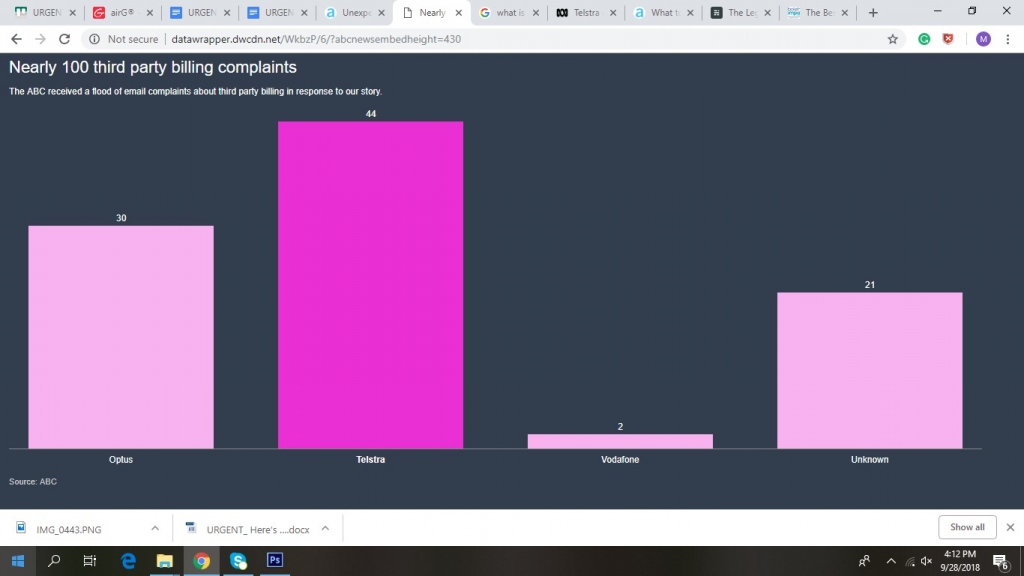Technology has managed to make life so easy for all of us. Owning a smartphone can help us with many tasks on the go and today it is considered a necessity rather than a luxury. However, nothing is more annoying than witnessing your device lag miserably while trying to execute these tasks, especially when you are short on time.
Spam can mess up with the performance of your smartphone but there is no reason to feel frustrated. Unlike real-life junk situations, it is much easier to fix this issue in the world of technology. There are different kinds of spam that can bother you. It can be push-alert notifications on your social media profile or an unknown spammer calling or texting you constantly.
Recently, many Vodafone and Telstra subscribers faced an unfortunate case of third-party billing scam where they were charged for AirG chat services without their consent. If you are reading this blog because you have fallen victim to confusing charges adding up every month on your phone bill for services you never signed up for, then you’re not alone. Unexplained fees and unhelpful telecom companies are much more common than you think. Millions of people from all over the world have found themselves embroiled in the same situation. But the question is that what is third party billing scam and how can you deal with it in a timely manner?
Keep reading to learn more about how can root out those unwanted services and save your hard-earned money from going down the drain:
What is a third-party billing scam?
Third party billing usually occurs when an operator calls you and confirms whether the charges for a call being placed by a friend or family member can be placed on your bill. Often, the operator is very persuasive and will try to convince you that the person is in trouble. Needless to say, it is a false story fabricated by the operator and if you accept the third party charges, then you’ll find the additional charges on your bill.
Another situation in which you will find yourself subscribed to services like the AirG spam is if you click on spam links or malicious ads while browsing the internet.
How many people are affected by third-party billing scam?
According to the Australian Communications Consumer Action Network (ACCAN) reports it could be about 1.9 million people or even more. Amazingly, no one knew why or how they had been subscribed to the so-called ‘premium content’ that they were paying for.
In fact, Telstra, one of the largest telecom service provider was taken to court and charged a hefty penalty because it admitted making false and misleading representations to over 100,000 customers in regards to its third-party billing service. They enticed customers to sign up for online content such as games, apps, and videos from third parties and charged it directly on their phone bill.

What to do if you get third-party charges on your phone bill?
Have you ever received a text message like the one shown below informing you that you have been subscribed to a service and will be charged a weekly or monthly fee for it?

Well, these kinds of messages do not come from your telecom service provider and are malicious in nature. Getting a message of this sort often results in extra charges that will appear in your phone bill. These charges occur because your telco is allowing a third party service provider to sell content to you. A recent survey found out that 12% of respondents have experienced a form of third-party billing charges on their phone bills in the last six months. In fact, Australians who were with Telstra, Optus or Vodafone received maximum unexpected charges on their phone bills because these mobile providers allowed third parties to sell their services to their customers.
How to unsubscribe from these services?
If you are experiencing a third-party billing scam, then it is time to take immediate action so that you can unsubscribe from these services:
- Check the text message or email to find a website link to the content. Visit the website’s account or settings section and cancel the subscription.
- Reply ‘stop’ to the number from which you are receiving the text messages about the service.
- Call the content provider’s helpline. You can easily find the number in any of the messages you are receiving or on the provider’s website.
- Contact your telco’s customer representative and ask them to block ALL third-party billing on your account to avoid further nuisance.
Get a refund:
- If you did not sign up to these services deliberately, then you have every right to request a refund from the content provider.
- Get in touch with your telco and lodge a complaint.
- If you still don’t get a satisfactory response from either of them, then raise your complaint the Telecommunications Industry, Ombudsman
Conclusion:
The best way to stay away from these sort of scams is to ask your telco to block all third-party billing on your account. Even if you have just signed up a new phone service call your telco customer representative and let them know that you don’t want any third-party billing ever.
It is easy for small businesses with multiple mobile phone accounts to overlook these small charges. But instead of letting them go unnoticed, we strongly advise you to bar all third-party billing on your account, whether it is a personal one or a business account.
As they say, prevention is better than cure. So, do what it takes to prevent losing your hard earned money even if it is a couple of dollars a week. For more tips on how to keep your mobile spam free, read this informative article.
Have you ever been in a similar situation where you were charged for third-party services without your consent? If yes, share more about how you managed to break free from the vicious cycle and unsubscribed to these services.



